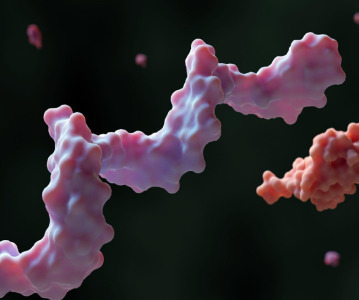NPL-Led Studies Explore Bacteria-Destroying Proteins for More Efficient Antibiotics

A research team, led by the National Physical Laboratory (NPL), has done studies into how protein fragments found in our bodies destroy harmful bacteria — potentially moving us a step closer to a new generation of antibiotic treatment that is less prone to bacterial resistance.
The protein fragments, known as antimicrobial peptides, have fought bacteria in the human body for thousands of years by identifying and disrupting the structure of the bacterial membrane. But little is still known about the precise mechanisms they use to perofrm this process. The NPL-led team conducted two separate studies to better understand the process and help assess the feasibility of using human antimicrobial peptides as the basis of new treatments.
The first study used de novo protein design and nanoscale imaging techniques, atomic force microscopy and high resolution mass spectrometry, together with computer simulations. This combination, never used before for this application, allowed the scientists to study how the peptides destroy the bacteria on a molecular level.
The research, reported in PNAS, revealed that the peptides form nanoscale pores in the bacterial membranes, which subsequently expand until the membrane completely disintegrates. In targeting the membrane, a heterogeneous structure composed predominantly of proteins and lipids, it is thought that the peptides reduce the likelihood that bacteria will develop resistance. This is because many genes would need to mutate simultaneously to do so — a very unlikely scenario.
However, before they are considered for medical use, it is important that scientists understand the likelihood of bacteria becoming resistant to the peptides. A second NPL-led study looked to do just that, using a combination of measurements, imaging and molecular dynamics simulations. It explored whether and how bacteria could develop resistance to these antibiotic peptides as they have to conventional antibiotics like methicillin.
The findings, reported in the Journal of Biological Chemistry, suggest that antagonistic peptide chains secreted by bacterial cells or expressed on their surfaces may cause efficient anti-antimicrobial responses, meaning that bacteria could potentially thrive in the presence of the peptides. This discovery may give scientists a better understanding of bacterial resistance and help them choose the right approach when developing the peptides for medical use.
Dr Max Ryadnov, who leads NPL's scientific research in Biotechnology, said: “It is widely known that these antimicrobial peptides are very efficient at destroying bacteria, but previous measurement techniques only let us see to a detail of five nanometres. The unique combination of technologies used in this research allowed us to see the process at larger length scales and in finer detail. The implications of these research efforts could be considerable — potentially paving the way for an alternative to the current, increasingly inefficient, antibiotic treatments, but also helping us understand the potential vulnerabilities of therapeutics based on these peptides.”
The research was led by NPL and featured scientists from the London Centre for Nanotechnology, UCL, University of Edinburgh, University of Bristol, University of Oxford, Freie Universität Berlin and IBM.
Related News
-
News Google-backed start-up raises US$600 million to support AI drug discovery and design
London-based Isomorphic Labs, an AI-driven drug design and development start-up backed by Google’s AI research lab DeepMind, has raised US$600 million in its first external funding round by Thrive Capital. The funding will provide further power t... -
News AstraZeneca to invest US$2.5 billion in Beijing R&D centre
Amid investigations of former AstraZeneca China head Leon Wang in 2024, AstraZeneca have outlined plans to establish its sixth global strategic R&D centre in China. Their aim is to further advance life sciences in China with major research and manufact... -
News Experimental drug for managing aortic valve stenosis shows promise
The new small molecule drug ataciguat is garnering attention for its potential to manage aortic valve stenosis, which may prevent the need for surgery and significantly improve patient experience. -
News How GLP-1 agonists are reshaping drug delivery innovations
GLP-1 agonist drug products like Ozempic, Wegovy, and Mounjaro have taken the healthcare industry by storm in recent years. Originally conceived as treatment for Type 2 diabetes, the weight-loss effects of these products have taken on unprecedented int... -
News A Day in the Life of a Start-Up Founder and CEO
At CPHI we work to support Start-Up companies in the pharmaceutical industry and recognise the expertise and innovative angles they bring to the field. Through our Start-Up Programme we have gotten to know some of these leaders, and in this Day in the ... -
News Biopharmaceutical manufacturing boost part of new UK government budget
In their national budget announced by the UK Labour Party, biopharmaceutical production and manufacturing are set to receive a significant boost in capital grants through the Life Sciences Innovative Manufacturing Fund (LSIMF). -
News CPHI Podcast Series: The power of proteins in antibody drug development
In the latest episode of the CPHI Podcast Series, Lucy Chard is joined by Thomas Cornell from Abzena to discuss protein engineering for drug design and development. -
News Amgen sues Samsung biologics unit over biosimilar for bone disease
Samsung Bioepis, the biologics unit of Samsung, has been issued a lawsuit brought forth by Amgen over proposed biosimilars of Amgen’s bone drugs Prolia and Xgeva.
Position your company at the heart of the global Pharma industry with a CPHI Online membership
-
Your products and solutions visible to thousands of visitors within the largest Pharma marketplace
-
Generate high-quality, engaged leads for your business, all year round
-
Promote your business as the industry’s thought-leader by hosting your reports, brochures and videos within your profile
-
Your company’s profile boosted at all participating CPHI events
-
An easy-to-use platform with a detailed dashboard showing your leads and performance







.png)